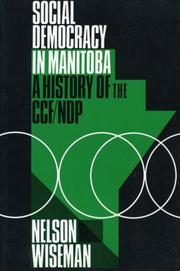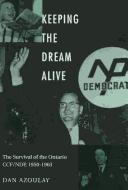| Listing 1 - 10 of 18 | << page >> |
Sort by
|
Book
ISBN: 1551646676 9781551646671 9781551646657 155164665X 9781551646633 1551646633 Year: 2018 Publisher: Montreal, Quebec
Abstract | Keywords | Export | Availability | Bookmark
 Loading...
Loading...Choose an application
- Reference Manager
- EndNote
- RefWorks (Direct export to RefWorks)
"Left, Right: Marching to the Beat of Imperial Canada details the Canadian Left's promotion of colonial policies and nationalist myths. Yves Engler's latest book outlines the NDP's and labour unions' role in confusing Canadians; from Korea to Libya, Canada's major left-wing political party has backed unjust wars; Canadian unions supported the creation of NATO, the Korean War, the assassination of Patrice Lumumba, the Bay of Pigs invasion and the coup in Haiti. Left, Right also shows how prominent Left commentators concede a great deal to the dominant ideology. Whether it's Linda McQuaig turning Lester Pearson into an anti-US peacenik, Stephen Lewis praising Canada's role in Africa, or others mindlessly demanding more so-called peacekeeping, Left intellectuals regularly undermine the building of a just foreign policy. Left nationalist ideology, both Canadian and Quebecois, has warped the foreign policy discussion; viewing their country as a semi-colony struggling for its independence has blinded progressives to a long history of supporting empire and advancing corporate interests abroad. Even many victims of Canadian colonialism among indigenous communities have succumbed to the siren song of supporting imperialism. Finally, Left, Right suggests some ways to get the Left working for an ecologically sound, peace-promoting, non-exploitative foreign policy that does no harm and treats others the way we wish to be treated."--

ISBN: 1283091135 9786613091130 0887553664 9780887553660 0887556159 9780887556159 Year: 1985 Publisher: Winnipeg, Man. University of Manitoba Press
Abstract | Keywords | Export | Availability | Bookmark
 Loading...
Loading...Choose an application
- Reference Manager
- EndNote
- RefWorks (Direct export to RefWorks)
In this volume, Nelson Wiseman skilfully describes the history of the New Democratic Party in Manitoba, tracing the roots of the social democratic movement to the years of mass immigration and social unrest that preceded the Winnipeg General Strike in 1919. Drawing extensively on personal interviews, on the private papers and correspondence of party leaders and activists, and on archival materials, Wiseman portrays clearly the party’s philosophy and leadership, its organization and inner workings, its electoral support, and its relations with other parties, with labour, and with farmers.
Socialism --- Marxism --- Social democracy --- Socialist movements --- Collectivism --- Anarchism --- Communism --- Critical theory --- History. --- New Democratic Party of Manitoba --- New Democratic Party. --- NDP --- N.D.P. --- Manitoba New Democratic Party
Book
ISBN: 077482851X 9780774828512 9780774828529 0774828528 Year: 2014 Publisher: Vancouver
Abstract | Keywords | Export | Availability | Bookmark
 Loading...
Loading...Choose an application
- Reference Manager
- EndNote
- RefWorks (Direct export to RefWorks)
In the 2011 general election, the New Democratic Party stunned political pundits by becoming the Official Opposition in the House of Commons. After near collapse in the 1993 election, how did the NDP manage to win triple the seats of its Liberal rivals and take more than three-quarters of the ridings in Quebec?
Socialism --- New Democratic Party --- History --- 1900 - 2099 --- Canada.
Book
ISBN: 1772121282 1772121266 9781772121285 9781772121261 9781772121278 1772121274 9781772121254 Year: 2015 Publisher: Edmonton, Alberta, Canada
Abstract | Keywords | Export | Availability | Bookmark
 Loading...
Loading...Choose an application
- Reference Manager
- EndNote
- RefWorks (Direct export to RefWorks)
Biography of Grant Notley, leader of Alberta's New Democratic Party from 1968 to 1984.
Politicians --- Hommes politiques --- Statesmen --- Notley, Grant, --- Alberta New Democratic Party --- Alberta New Democrats --- New Democratic Party (Alta.) --- History. --- Histoire. --- Alberta --- Government of Alberta --- Politics and government --- Politique et gouvernement --- Since 1971 --- Biography/Political Science/Alberta Politics.
Periodical
Abstract | Keywords | Export | Availability | Bookmark
 Loading...
Loading...Choose an application
- Reference Manager
- EndNote
- RefWorks (Direct export to RefWorks)
New Democratic Party of British Columbia --- Parti nouveau démocratique de la Colombie-Britannique --- New Democratic Party of British Columbia. --- Periodicals. --- Périodiques. --- Victoria Region (B.C.) --- Victoria, Région de (C.-B.) --- British Columbia --- Politics and government --- Administration
Book
ISBN: 088864244X Year: 1992 Publisher: Edmonton, Alta. : University of Alberta Press,
Abstract | Keywords | Export | Availability | Bookmark
 Loading...
Loading...Choose an application
- Reference Manager
- EndNote
- RefWorks (Direct export to RefWorks)
Politicians --- Hommes politiques --- Biography. --- Biographies --- Notley, Grant, --- Alberta New Democratic Party --- Alberta --- Alberta --- Politics and government. --- Politique et gouvernement
Book
ISBN: 0773503897 0773503900 Year: 1984 Publisher: Kingston : McGill-Queen's University Press,
Abstract | Keywords | Export | Availability | Bookmark
 Loading...
Loading...Choose an application
- Reference Manager
- EndNote
- RefWorks (Direct export to RefWorks)
New Democratic Party of Ontario --- Co-operative Commonwealth Federation --- Ontario --- Ontario --- Politics and government --- Politique et gouvernement
Book
ISBN: 1282850717 9786612850714 0773561005 9780773561007 0773504362 9780773504363 0773504370 9780773504370 9781282850712 661285071X Year: 1984 Publisher: Kingston [Ont.] McGill-Queen's University Press
Abstract | Keywords | Export | Availability | Bookmark
 Loading...
Loading...Choose an application
- Reference Manager
- EndNote
- RefWorks (Direct export to RefWorks)
A fresh perspective on the role of democratic socialist ideology in Canadian politics emerges from this study of the first NDP government of Manitoba (1969-77). The policies and performance of the administration headed by Edward Schreyer are evaluated in the light of what might be expected of a social democratic party in office. Measured by such criteria as the redistribution of wealth, the growth of public ownership, the extension of government planning, and public participation in decision making, the achievements of the Schreyer government fell short of the expectations of its supporters and the good intentions of socialist ideology. Just as significant as the lack of substantive change in these areas was the marginality of the programs and policy changes that were introduced. Reasons for the failure to create a new society in Manitoba are found in the evolution of the CCF-NDP, the organization of the provincial party, the make-up of caucus and cabinet, and the social basis of support for the NDP - so diffuse that electoral success depended largely on the popularity of the party leader. But the dilemma of the NDP government was essentially that of any democratic socialist movement confronted by the near-impossibility of radically altering a society dominated by capitalist economic institutions while adhering to the norms of parliamentary democracy. In addition to providing insight into an important and hitherto unstudied period in provincial politics.
Socialism --- Marxism --- Social democracy --- Socialist movements --- Collectivism --- Anarchism --- Communism --- Critical theory --- Schreyer, Edward R. --- Schreyer, Ed --- New Democratic Party of Manitoba --- New Democratic Party. --- NDP --- N.D.P. --- Manitoba New Democratic Party --- History. --- Manitoba --- Province of Manitoba --- Province du Manitoba --- Rupert's Land --- Politics and government.
Book
ISBN: 0889773572 9780889773578 0889773556 9780889773554 9780889773561 0889773564 Year: 2014 Publisher: Regina, Saskatchewan
Abstract | Keywords | Export | Availability | Bookmark
 Loading...
Loading...Choose an application
- Reference Manager
- EndNote
- RefWorks (Direct export to RefWorks)
Elections are a critical component of democracy, yet civic engagement has reached a post-war low in Manitoba. Barely half of all eligible voters showed up to vote in the last three provincial elections. Surveys show that many of these non-voters feel alienated from the political process, or have other priorities on Election Day. Of particular interest is the rate of turnout among youth, aboriginals, and immigrants. This important Canadian case study addresses the democratic deficit from a wide range of perspectives, providing scholars, observers, and citizens with an accessible account of politics and elections in Manitoba, while illuminating an issue that resonates across the country.--Provided by publisher
Political campaigns --- Political parties --- Parties, Political --- Party systems, Political --- Political party systems --- Political science --- Divided government --- Intra-party disagreements (Political parties) --- Political conventions --- Campaigns, Election --- Campaigns, Political --- Election campaigns --- Electioneering --- Electoral politics --- Negative campaigns --- Politics, Practical --- Elections --- Manitoba. --- New Democratic Party of Manitoba. --- New Democratic Party. --- NDP --- N.D.P. --- Manitoba New Democratic Party --- Legislative Assembly of Manitoba --- Elections, 2011. --- Manitoba --- Province of Manitoba --- Province du Manitoba --- Rupert's Land --- Politics and government --- fixed date, elections, Manitoba.

ISBN: 1282854593 9786612854590 0773566694 9780773566699 0773516344 9780773516342 Year: 1997 Publisher: Montreal [Que.] McGill-Queen's University Press
Abstract | Keywords | Export | Availability | Bookmark
 Loading...
Loading...Choose an application
- Reference Manager
- EndNote
- RefWorks (Direct export to RefWorks)
Azoulay delineates the central themes and determining factors of the party's development during the 1950s and early 1960s. The CCF/NDP had to contend with not only a booming postwar economy and a very popular premier but also a Cold War-induced phobia toward the Left and serious intraparty divisions. Despite this the party slowly recovered, led by a core of dedicated activists and employing an array of strategies, including the much-publicized transformation of the CCF into the NDP in the early 1960s. The author counters allegations that the CCF/NDP opportunistically abandoned its essential qualities (such as its socialist ideology or democratic structure) for the sake of electoral gain and that organized labour played a leading role in the party in these years, contributing to the dilution of the movement. Although the party sought new alliances among the province's less privileged groups, especially organized labour, it did so cautiously and even hesitantly, always conscious of the need to preserve its basic identity.
Co-operative Commonwealth Federation. --- New Democratic Party of Ontario --- Nouveau parti démocratique de l'Ontario --- Ontario New Democrats --- Nouveau parti démocratique --- Ontario New Democratic Party --- NDP --- N.D.P. --- N.P.D. --- NPD --- History. --- POLITICAL SCIENCE / Political ideologies / Democracy. --- Public administration
| Listing 1 - 10 of 18 | << page >> |
Sort by
|

 Search
Search Feedback
Feedback About UniCat
About UniCat  Help
Help News
News